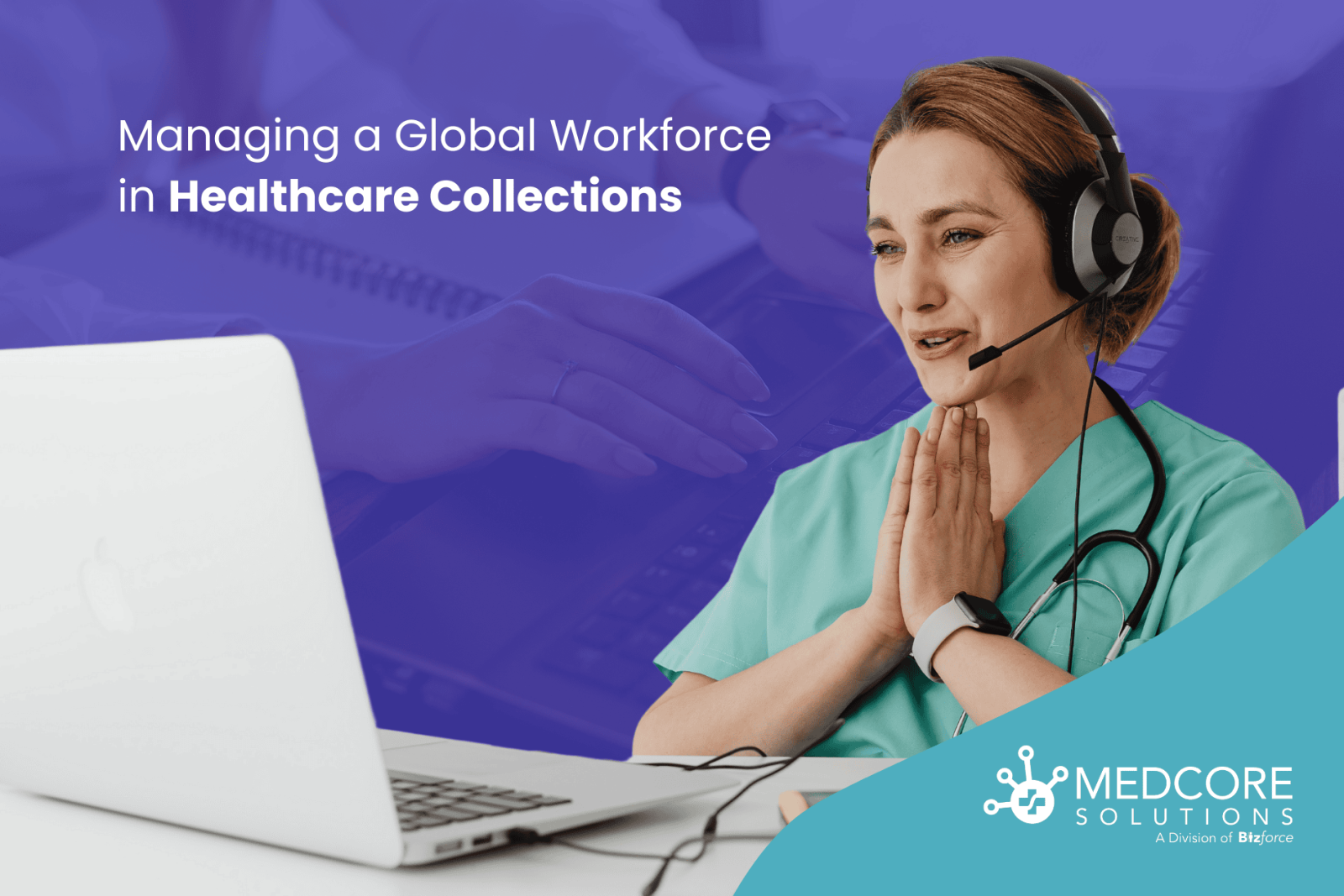Data security is more critical than ever in today’s globalized healthcare landscape. According to a study by the Ponemon Institute, 54% of healthcare vendors have faced at least one data breach involving protected health information, underscoring the urgent need for robust security measures. As managing a global healthcare collections workforce becomes the norm in our interconnected world, healthcare providers face both opportunities and challenges. In healthcare collections, a global workforce can unlock remarkable potential: optimizing operations, reducing costs, and driving efficiency. Yet, this approach demands thoughtful strategies to overcome hurdles like compliance, communication, and data protection.
For healthcare providers, successfully managing a global workforce in healthcare collections is essential to ensuring a seamless revenue cycle and achieving better financial outcomes. In this blog, we’ll delve into practical strategies, innovative tools, and proven policies to help you navigate these challenges and set your organization up for success in healthcare collections.
The Benefits of a Global Workforce in Healthcare Collections

Before diving into management strategies, it’s important to understand the advantages of employing a global workforce in healthcare collections. These include:
- Cost Efficiency: Leveraging remote talent from different regions can reduce operational costs without compromising on quality. Many international professionals offer specialized expertise at competitive rates.
- 24/7 Operations: A global healthcare collections workforce enables round-the-clock operations. Collections tasks, follow-ups, and patient communications can continue seamlessly, improving efficiency and cash flow.
- Access to Talent: Broadening the talent pool allows healthcare providers to tap into a diverse and skilled workforce, including professionals with niche expertise in healthcare collections and revenue cycle management.
- Scalability: A global workforce offers flexibility in scaling operations up or down based on demand, ensuring optimal resource utilization.
In particular, MedCore Solutions stands out as a trusted provider of skilled collections specialists, offering healthcare providers access to experienced professionals adept at managing healthcare collections and revenue cycle processes. MedCore’s specialists bring industry expertise and a commitment to excellence, ensuring seamless integration with your operations and delivering measurable results.
Challenges in Managing a Global Workforce in Healthcare Collections
While the benefits are compelling, managing a global healthcare collections workforce comes with its share of challenges. Healthcare providers must address these effectively to reap the full benefits of their diverse teams:
- Cultural and Language Differences: Navigating cultural nuances and language barriers requires sensitivity and effort.
- Time Zone Management: Coordinating across multiple time zones can complicate scheduling and collaboration.
- Compliance and Data Security: Healthcare collections involve sensitive patient information, necessitating strict adherence to compliance standards like HIPAA.
- Communication Gaps: Remote teams may face challenges in staying aligned without clear communication channels.
- Team Engagement: Building a cohesive and motivated global team can be challenging, particularly when workers are spread across different regions.
Strategies for Managing a Global Workforce in Healthcare Collections

-
Implement Robust Training Programs
Training is a cornerstone of managing a successful global team. Healthcare collections require specialized knowledge, including familiarity with coding systems, insurance processes, and compliance regulations.
- Standardized Onboarding: Ensure all team members undergo a comprehensive onboarding process that covers company policies, compliance standards, and job-specific training.
- Continuous Learning: Provide ongoing training sessions to keep the team updated on the latest industry trends and regulatory changes.
- Cultural Sensitivity Training: Equip employees with the tools to navigate cultural differences effectively, fostering mutual respect and understanding.
-
Leverage Advanced Technology
Technology is a critical enabler of global healthcare collections workforce management. The right tools can simplify communication, streamline workflows, and enhance data security.
- Secure Collaboration Platforms: Use platforms like Slack, Microsoft Teams, or Zoom to facilitate real-time communication and collaboration.
- Healthcare-Specific Tools: Invest in revenue cycle management (RCM) software and electronic health record (EHR) systems that integrate collections workflows.
- Data Security Solutions: Implement robust cybersecurity measures, including encryption, multi-factor authentication, and secure data-sharing protocols, to protect patient information.
-
Establish Clear Communication Channels
Effective communication is the backbone of a well-managed global team. Miscommunication can lead to errors, delays, and dissatisfaction.
- Regular Check-Ins: Schedule regular team meetings to align on goals, discuss progress, and address challenges.
- Asynchronous Communication: Leverage tools like email or task management software for team members in different time zones to contribute without real-time constraints.
- Clarity in Expectations: Clearly define roles, responsibilities, and performance metrics to avoid confusion.
-
Focus on Compliance and Data Privacy
Compliance is non-negotiable in healthcare collections. Failing to adhere to regulatory standards can lead to severe penalties and loss of trust.
- HIPAA Training: Ensure all team members understand and comply with HIPAA regulations and other relevant standards.
- Regular Audits: Conduct periodic audits to identify and address potential compliance gaps.
- Secure Access Protocols: Limit data access to authorized personnel and maintain detailed logs of all activities.
-
Optimize Scheduling and Time Zone Management
Time zone differences can be a logistical challenge, but with thoughtful planning, they can also be an advantage.
- Shift Rotations: Create schedules that maximize overlap for critical tasks while maintaining 24/7 coverage.
- Flexible Working Hours: Allow team members to work during their most productive hours, ensuring a better work-life balance.
- Centralized Tools: Use cloud-based tools that provide real-time updates accessible to all team members regardless of location.
-
Foster Team Engagement and Collaboration
A motivated and engaged team is more productive and committed to achieving organizational goals.
- Virtual Team-Building Activities: Organize online games, challenges, or casual meetups to strengthen team bonds.
- Recognition Programs: Acknowledge and reward outstanding performance regularly.
- Open Feedback Channels: Encourage team members to share feedback and ideas, fostering a sense of ownership and belonging.
-
Collaborate with Specialized Staffing Agencies
Working with agencies experienced in healthcare staffing can simplify the process of building and managing a global healthcare collections workforce.
- Tailored Talent Matching: Agencies can connect you with professionals who possess the exact skills and experience you need.
- Administrative Support: They often handle payroll, compliance, and other administrative tasks, reducing your workload.
- Scalability: Staffing agencies offer the flexibility to scale your team as needed, making them a valuable partner in dynamic environments.
Measuring Success
To ensure your strategies are effective, establish key performance indicators (KPIs) and monitor them consistently. These might include:
- Collection Rates: Track the percentage of accounts successfully collected.
- Turnaround Time: Measure the time taken to resolve outstanding accounts.
- Compliance Metrics: Evaluate adherence to regulatory standards and audit findings.
- Employee Satisfaction: Use surveys to gauge team morale and engagement.
- Patient Satisfaction: Monitor feedback related to billing and collections interactions.
Conclusion
Managing a global workforce in healthcare collections requires a blend of strategic planning, technological investment, and cultural sensitivity. By addressing challenges proactively and implementing the right practices, healthcare providers can harness the full potential of their global teams.
A well-managed global healthcare collections workforce not only enhances operational efficiency but also ensures better patient experiences and financial outcomes. By following the strategies outlined in this blog, healthcare providers can confidently navigate the complexities of managing a global team and set the stage for long-term success in healthcare collections.
Ready to take your healthcare collections to the next level? Partner with MedCore Solutions, the trusted healthcare staffing company that provides skilled collections specialists tailored to your needs. With our expertise and commitment to excellence, we help healthcare providers optimize their revenue cycle management while enhancing patient satisfaction. Let us help you build a reliable and efficient global team. Contact us today and discover how MedCore can transform your collections process!

